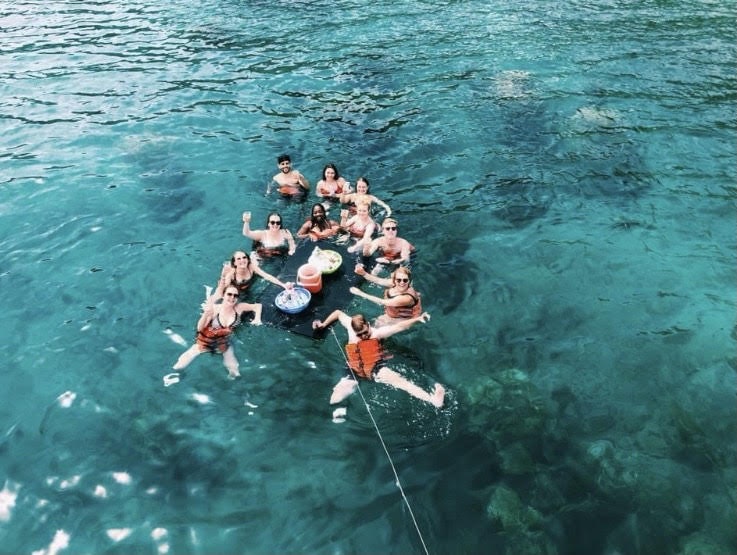Victoria's Allergen Diary Part 5: Travelling With Allergies

Welcome to The Allergen Diaries, in which we explore first-hand the challenges and problems faced by severe allergy sufferers as consumers in the foodservice industry.
You’ll know that Erudus’s very own Victoria McEwan is our current columnist. Victoria suffers from a number of serious allergies, as well as some of the health issues commonly associated with them, and in her previous posts she covered the basics of living with multiple allergies, moving away from home as an allergy sufferer,and how her allergies affect both people like her and those who work in the hospitality industry. In Part 4 she gave Caterers the inside track on how they can best serve those with allergies.
Victoria, like many of us, is looking forward to a time when we can be free to enjoy summer holidays and travel to our hearts’ content. So now is the perfect time to get educated on what travelling is like for those with severe allergies. We’ll hand you over to Victoria...
“As far as dealing with food allergies goes, it’s something I try not to let it affect my life that much. I feel like allergies are something that definitely shouldn’t get in the way of being able to enjoy all that life has to offer!
I’m a big lover of travel and have been to so many amazing places across the globe - from some of the greatest big cities (Vegas, Berlin, Milan and Rome to name a few) to your typical 18 year old girls holiday destinations. I even travelled around Asia for a month in the summer of my third year of University. I went to all of these places with a severe peanut allergy and Coeliac Disease. Which proves that it is doable. But though travelling with an allergy is not as scary as you think, there are some things you should take note of before you go.

Travel Insurance & Medication
Make sure you get travel insurance that covers your allergies. That way if something does go wrong and you need emergency help or medical treatment, you have peace of mind that you’re covered completely. Whilst it might be more expensive, there’s nothing scarier than not being able to get the correct help and worrying about being able to afford it.
Make sure you print off your insurance documents, or screenshot them so you always have them handy. Take a copy of your repeat prescriptions and, if you can, get a letter from your GP with details of your medication and why you need them - this can save any troubles getting through customs and if you need medical help whilst away. Ensure you have the number for emergency services in your location saved on your phone.
Top Tip: Whatever medication you have, take spares. I tend to keep 2 of each item in my hand luggage and a spare in my suitcase so I’m fully stocked up.
Planes
Airlines have different policies, so it’s best to check with the one you’re flying with beforehand and let them know that you have a severe allergy to see if they can accommodate you. As you board the plane, make sure to have documents ready incase you need to provide them, but let the staff know at the gate and as you board.
I’ve been on flights with RyanAir, KLM, Easy Jet and Emirates and when I told them about my nut allergy, an announcement was made each time about no nuts being consumed on board this flight due to a nut allergy passenger. If you are very worried about your allergy, request to sit at the front of the plane where you have less exposure to the rest of the cabin. If you’re on a long haul flight, make sure you notify the airline of any dietary requirements prior so you can arrange a suitable meal for your flight.
Top Tip: Always have clear ziplock bags ready to store your medication in for hassle free boarding!
Countries where you do not speak the language
When you can speak the language of the country you're visiting it makes things a whole lot easier when trying to communicate. But if you don’t speak the language, don’t let it deter you from the trip of a lifetime! I (unfortunately) don’t speak fluent Italian, Greek, Thai, Khmer, Vietnamese, French, Spanish, or German - however I have travelled to places where this is the native tongue. So how do you communicate your allergies or dietary requests?
I think trying to learn the basics of the language is important as it shows you’re trying to connect with the people and the culture, which is always appreciated. This makes it easier when you do try to communicate your allergies.
When travelling, I always look up the phrases for my allergies on Google Translate beforehand and screenshot them so I’m prepared - for example “I can’t eat peanuts or I will die” or “I need nut-free food or I will die” (dramatic, but it gets the message across) and communicate this before entering a restaurant. Images to go with phrases also helps - for example a picture of your allergen with a red cross in front of it. Sometimes images are easier to identify than words.

I can safely say that I’ve never had any serious issues - most people have knowledge of the English language, and if you say peanut’s will kill me the message is very clear! I also learnt that in Asia nowadays they cook with soybean oil rather than peanut oil because it’s cheaper, and that peanuts are only usually added as decoration on dishes, not as part of the cooking process - making it less risky. But there are still risks of cross-contamination, and every establishment is different, so mention your allergy every single time you go in.
Ultimately, you should feel at ease and like the staff know what they’re doing. Once in Milan me and my friend entered a restaurant where we proceeded to speak to them, showing them the phrases “no gluten”, and “no nuts” in Italian however they kept offering me dishes which I was certain had gluten in them. I just remember feeling really awkward but also afraid of coming across as rude if we just left. In the end I felt so worried at the thought I might eat something that would make me poorly, and in these instances it is important to leave and eat somewhere you feel completely safe. We eventually found somewhere that understood my requirements straight away and I knew I had made the right decision.
If you’re staying in a hotel
If you’re staying in a hotel during your trip, contact them in good timing beforehand and make sure they know the dates you’re coming to stay and ask if they can accommodate you. Nowadays most hotels have options for those with allergies and dietary restrictions but if not, most will accommodate you whether that means ordering certain products for you such as gluten free breads for breakfast or even cooking you separate meals.
Research Restaurants
Researching potential places to eat beforehand is a really good way to make yourself feel at ease and give you options. Going to Rome I remember worrying, as the delicacies of Italy are practically 100% gluten. I searched ‘gluten-free restaurants Rome’, or the name of the neighbourhoods within the city to look at some of the suggestions. We ended up finding an eatery which offered completely gluten-free food as well as normal non-gluten options, they operated 2 separate kitchens in the same premises. Me and my family went there the first night and we loved it so much we ended up going back multiple times. I’ve done the same thing in Milan, and me and my friend found a 100% gluten free bakery and when travelling in Asia I found many restaurants offering gluten and nut-free dishes through Google searches, so making a list of potential places is great!

Take backup snacks in your suitcase
I can’t imagine a situation where even if you were to go to a restaurant and order a plain piece of meat, potatoes and vegetables [whilst having an allergy] that they would decline. But sometimes you do have situations where the other party will not serve you - this happened to me in Berlin where a chain restaurant refused to serve me because of my allergy after I’d ordered lunch to takeaway and noticed they had still put nuts in the dish. Therefore it’s important to take backup snacks and goodies in your suitcase. Sometimes I’ve packed a loaf of bread in case establishments don’t have gluten-free bread, or a pack of cereal bars to take out and about with me whilst sightseeing so if there are no options then I have something to satisfy myself!
How Caterers can help travellers
Encouraging customers that you cater for to let you know about their allergies and how you can help them is vital. I know that at Erudus we have a range of industry resources that can help you showcase that you’re in the know about allergens across your menus, in your establishment and on your website.
How Erudus can help you manage allergens
As an allergy sufferer I’m especially appreciative of the tools Erudus offer to Caterers to make adapting challenges and new legislation in the foodservice industry as easy and efficient as possible. I love the solutions to help Caterers (and Retailers) manage and communicate the allergen content of their products.
Our Recipe Builder allows you to instantly find allergen information for a single ingredient, or view the aggregated allergen summary for an entire recipe.
Our Allergen and Nutritional Search provides essential allergen and nutritional information across tens of thousands of products, directly from the Manufacturer.
And you can find out more about how Erudus can help Caterers here.
Next time on Victoria’s Allergy Diaries: Victoria discusses how to navigate the world of friends, family and dating with allergies.
Catch up on the first series of The Insider Diaries – Beth’s Allergy Blog,here.



